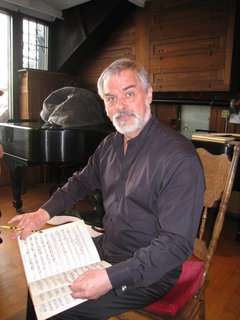|
Back
A Singular Trio New York
BargeMusic, Old Fulton Street, Brooklyn
06/06/2009 - & June 7, 2009 (3pm)
Here and Now: American Contemporary Music Series:
George Tsontakis: String Quartet No. 4, “Beneath Thy Tenderness of Heart”
Ruth Crawford Seeger: Quartet
Charles Ives: String Quartet No. 1, “A Revival Service”
The American String Quartet: Peter Winograd, Laurie Carney (Violins), Daniel Avshalomov (Viola), Wolfram Koessel (Cello)

D. Avshalomov (© Harry Rolnick)
The eponymous barge for BargeMusic can be intimidating from the outside. On a warm summer evening, concertgoers can view the whole New York skyline, from the Statue of Liberty to the Empire State Building. They stand where General George Washington embarked on the voyage which would make America a free country. They stare up to see two huge beautiful bridges, and back to see a pantheon of good restaurants and forward to see the great Hudson River, celebrated this year for the 400th anniversary of the White Man exploring it. Native Americans of course explored it for countless centuries before.
However awesome the outside is, BargeMusic’s concert hall is intimate, friendly, and, a wave-rocking little theatre, provincial in every way except the music.
The theatre has no backstage, so musicians have little choice but to circulate with the audience, adding the element of a European music festival. Audiences are always enthusiastic, and usually knowledgeable.
Still, certain evenings are not always the best for performers. Friday evening, we sat packed, cheek by jowl to hear music of the 13th Century. Tonight (Saturday), barely three-dozen rapt listeners heard the celebrated American String Quartet play all American music.
Like BargeMusic itself, the American String Quartet has been around for 30 years, garnering a reputation for music far removed from mere Americana. But BargeMusic was ready for a treat. And while the audience was sparse, the American String Quartet took three singular works of the last century and played them with remarkable enthusiasm.
The three works might have been unfamiliar to many (I knew only the early Ives quartet), but two of the three were very familiar indeed, since both the Tsontakis and the Ives quartet quote extensively from other music.
It was ironic (or perhaps planned) that composer George Rochberg wrote the program notes for Tsontakis’s Fourth String Quartet, making note of its firm contrasts of tonality and atonality. After all it was Rochberg who pioneered this in his own Third Quartet, with its echoes of Mahler and Beethoven. Tsontakis, though, created a kind of “spot-the-Ludwig” puzzle, with many a direct quote from Beethoven. That, though hardly describes this piece, which is so energetic, filled with floods of notes, a whole movement of double-stopped instruments and an elemental force.
Like much of the composer, it has a religious overtone, even starting with a Russian hymn (reminiscent of Beethoven’s “Russian” quartets), but from then on, the work was dazzling for its intricacies, some of which hid notes from Mr. B’s Violin Concerto, his late piano sonatas and even the Fifth Symphony.
The American String Quartet ignored the paucity of listeners, but they played with all the energy the piece deserved. Ditto for the 1931 String Quartet of Ruth Crawford Seeger (yes, the stepmother of Pete!).
Ms. Seeger visited and studied with most of the atonalists, but shunned Schoenberg, who she felt was “too rigid”. Her piece sounded atonal, but was totally accessible. In a mere ten minutes, she produced beautiful “conversations” with the instruments, a sudden finale and an Andante of assured flowing, liquid musical themes, one piling on top of another.
Finally, we had the “easy” Charles Ives. The first movement was used later in his Fourth Symphony, but here it was very simple. An, academic, fugue for four instruments, ending “correctly”. The Fourth Symphony version has a grand surprise at the end—four measures from Joy To The World. They were sadly missed here.
The other three movements were delightful renditions of hymns, folk songs and rousing come-to-Jesus moments where are never taken too seriously.
This afternoon, the American String Quartet repeats the program. One must remember that the sun may shine on many other Sundays this summer, but listening to the quartet play this trio is, like the steaks served around the corner, both rare and well done.
Harry Rolnick
|